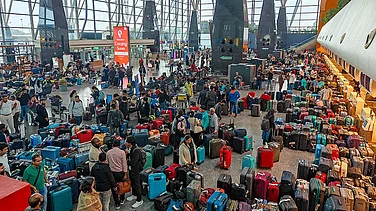Across the Indravati river, in the Naxal belt of South Bastar, lies the little village of Pahurnar in Dantewada. For the first time in decades, this village has got a polling booth, located inside a public school - both hallmarks of democratic development in the village, which lies at the base of the dreaded Abujhmarh hills. The 4,000 acres of forested hills and slopes are known to be home to the top brass of the Naxals whose armed resistance against successive central and state governments make elections a difficult and often bloody prospect in the region. This year, however, seems to be different.
As many as 126 new polling booths have been installed in “sensitive” and “ultra sensitive” areas of Bastar. The school in which the Pahurnar station is located, however, wears an air of ominous anticipation. It’s deserted, save a lone groundskeeper, a government employee, who nevertheless looks enthused. “We used to have elections once, it’s good that things are returning to normal," he says.
But are they? It depends on whom you ask. While the Chhattisgarh government is trying to project an “all is swell” image of Bastar, the threat of violence, nevertheless, looms large and several instances of violence have taken place in the run up to the first phase of Assembly elections on November 7 when 20 seats including 12 Assembly constituencies of Bastar will be electing their MLA for the next five years.
On Saturday morning, three days ahead of the first phase, BJP worker and district Upadhyaksh Ratan Dubey was killed by Maoists while he was campaigning in Kaushalnagar village. Dubey had travelled from Narayanpur from the village and was speaking to villagers when he was ambushed by Maoists in civil clothes. In fact, most BJP leaders have been unable to travel to Naxal dominated areas where there is a clear diktat to oppose the party and its candidates.
Previously, BJP’s Chotedonger leader Sagar Sahu was also killed by Maoists who shot him inside his home. On Monday, a day ahead of polls, three persons in Bastar were left injured in an IED blast in Kanker district. In Narayanpur which has seen violence and conflict between Christian and non-Christian tribals, three candidates of the newly floated Christian-tribal party Sarva Sampan Dal have withdrawn their candidacy, citing threats and a hostile reception toward their campaigns and rallies. As per sources in Bastar, two Congress leaders in the region have also allegedly received threats from Naxalites for extending their support to a certain mining project.
In view of the incidents, 149 polling stations in five assembly constituencies have been shifted to locations adjacent to police stations and 120 leaders have been given special security. On Monday, polling officials and ballot boxes were airlifted to polling stations in sensitive areas via helicopters under strict CRPF supervision.
There are 600 polling booths across Bastar and 273 in the region across Indravati river, which is still considered a Naxal stronghold. Out of these, 155 booths are considered to be in sensitive zones while 67 are considered very sensitive. At least 126 polling booths have been placed in sensitive zones for the first time, allowing locals to vote from or close to their villages. About 60,000 security personnel have been deployed including 40,000 personnel from Central Armed Police Force (CAPF) and 20,000 from state police force to provide three-layer security cover to voters as well as government officials manning the booths. Authorities seem confident that this time, the elections will go without hitch. Members of CoBRA, an elite anti-Naxal unit, as well as teams of specially trained women commandos have also been deployed.
According to Dantewada resident and scribe Raunak Shivhare, elections in the Abujhmarh areas and other regions across the Indravati have been possible due to the construction of a bridge across the river Indravati. “Constructed in 2021, it is the only land route connecting villages like Pahurnar to the rest of Dantewada,” he states. The threat, however, is very real, even for journalists like him. “In 2018, a Doordarshan journalist was killed, along with two security personnel, in a Maoist ambush in Aranpur village in Dantewada, two weeks ahead of elections,” he says.
Not all roads and bridges, however, have been welcomed by locals. Since 2021, hundreds of Adivasis in Bastar including large numbers of youth have participated in protests against the construction of around six bridges over the Indravati river, spread across locations that villagers claim are convenient for the government's mining projects. Rajendra, a member of the Sarv Adibasi Sanstha in Bijapur, states that villagers want development but not at the cost of their land and the forest. "Any land that tribals vacate is forever lost. No one is compensated or rehabilitated," he states, adding that villagers welcome roads but these bridges do not benefit villages. "We don't have cars, what's the use of bridges?" he laughs.
Adivasis and villagers also remain tense and tight lipped about elections. Jai Ram, a 21-year-old resident of Kasoli village, says that local people don’t like talking about politics in public because it marks them out. “We don’t have jobs or any safety net. We don’t have money. What do we know about politics? We don’t want to get in trouble,” he says, as he sits on the roadside in the evening in the week before polls, watching BJP, Congress, and other party convoys pass, flashing banners and slogans.
Jai Ram doesn’t remember much about the village he was born in. He left it when he was just a toddler. “We came here with the Salwa Judum in 2005,” he says. Born in Niram in Bijapur district in a heavily Naxal-inhabited region, Jai Ram and his family, like several others, moved to “camps” under pressure from the Salwa Judum, the state-sponsored paramilitary force of armed vigilantes created to hunt down Maoists in the region. Active for next few years, the Salwa Judum is infamous for its blatant humanitarian violations including the killing, looting, raping, torturing of villagers and burning entire villages in the name of fighting left-wing extremism. Several villages were forced to or chose to relocate to roadside camps at the time. Those who refused to leave their villages were branded as “Maoist” or Maoist sympathisers and often ended up “encountered”. Those who left could never go back as they would be targeted by the Naxals for siding with the police and government.
While polling booths are opening up in or around “sensitive” zones like Abujhmarh, families living in Kasoli are reticent of going back, fearing retribution from the Naxals. Many like Ghuddi, 42, have not seen their families and friends that got left behind for nearly two decades. However, fifteen families from Kasoli recently moved back to Niram and have reportedly been accepted back. The villagers long to go back not just because it was once their home but because here, on the other side of the river, they did not get what they had been promised. Keen on flushing out Naxals and the Jan Jangal James movement in Bastar, the Chhattisgarh government had promised jobs and rehabilitation among other benefits as incentives for tribals to move from forests to cities. The jobs never came, neither the rehabilitation.
Villages like Kasoli remain on the periphery of development, outcasts of their own society. A former member of the Salwa Judum who lives in Kasoli now works with the state police, a well hated entity among local Adivasis. He may not find it ideal but he has no other option. Others like Jai Ram work at private construction gigs. “We don’t get called for MNREGA work either,” he states. “Both Congress and BJP governments have ignored us,” he says.
Meanwhile, outside Pahurnar, 23-year-old Pallavi Nag who moved there from Bijapur as well lives in a house with no toilet. Scores and scores of houses in Bastar don’t have toilets, or tap water, despite schemes by the Central government for the same. Mother of one, Pallavi says that she does not benefit from any schemes by central government like Ujjwala, or the Godhan Nyay Yojana 2020 by the state government as they fail to reach her village. When asked whether she will vote in the coming elections, now that there is a voting booth in her village, she giggles. “What is the use though, they are all the same,” she says, much like Jai Ram.
Today, the “dance of democracy” will commence in Bastar and if things go without a hitch, many will claim that Bastar is now normalised, thanks to the inclusive policies of Congress. But violence is endemic in Bastar, where the balmy forest breeze is heavy with the weight of shed blood. It shows up in people’s alert eyes and sad smiles, in their low voices and inconspicuous homes. Just a few months ago, Bama Kuhrami of Keshkutul village was killed while looking for his cow. His wife has demanded compensation and assurance from the police that her young son will not be branded a terrorist. In another village, Bechapal, Mahendra Oyomi was allegedly killed by Naxals who suspected him of being a police informer.
Can democracy really dance in a room filled with guns? This election would be a test of its showmanship.
Key fights in Bastar in 2023
In Konta constituency seat in the heavily-Naxal inhabited Sukma district, this election will see a three-way fight between sitting Congress’s five time MLA and state cabinet minister Kawasi Lakhma, CPI leader Manish Kunjam who is contesting as an independent and BJP candidate Soyam Muka. Rife with memories of violence from the Salwa Judum era, this region is filled with issues relating to development, especially the the construction of the Polavaram dam which has led to protests by local tribal communities.
In Dantewada, Congress has fielded the controversial Chavindra Karma, son of the slain Congress leader Mahendra Karma and sitting MLA (and his mother) Devti Karma. The latter wrested the seat after BJP’s sitting MLA Bhima Mandavi was killed in a Maoist attack. The Karma family continues to hold sway in Dantewada. Mahendra Karma, an influential leader among Bastar Adivasis is credited with masterminding the Salva Judum movement. He was among the 27 killed in a pre-poll Maoist ambush in Jhiram valley in 2013. Incidentally, Lakhma was the sole survivor of the Jhiram massacre.
Locals in Dantewada, however, feel that Chavindra is a “risky” option. A local resident of Geedam says that Chavindra who is known for touting ammo and declaring that he will begin “Salwa Judum 2” before retracting the statement is unpredictable. The alleged cases of sexual abuse of local women by Karma is also a factor which sways many against his favour and could come handy for BJP’s Chaitram Atami, a veteran leader. Popular independent candidate Amulkar Nag who was denied a ticket by the BJP could also hurt Congress’ vote share.
Tribal-Christian conflict has become the key issue in Narayanpur this year. Home to Abujhmarh hills, one of the most heavily militarised regions in South Bastar and a Naxal stronghold, the seat is seeing a tough fight between Congress MLA Chandan Kashyap and former BJP state minister Kedar Kashyap. There is anger among locals in Narayanpur who claim that the Baghel government has been passive toward the issue of Christian conversions while the Christian tribals are feeling alienated due the government’s lack of support and protection for them.
The BJP has for a few months been campaigning around the agenda of religious conversions and the seat has been seeing increasing instances of anti-Christian violence including attacks on a church inside a school. BJP’s new state vice president and rising leader Lata Ushendi is facing off with sitting Congress MLA Mohan Markam while Savita Mandavi, wife of late MLA Manoj Mandavi will be contesting from Bahnupratappur.






















